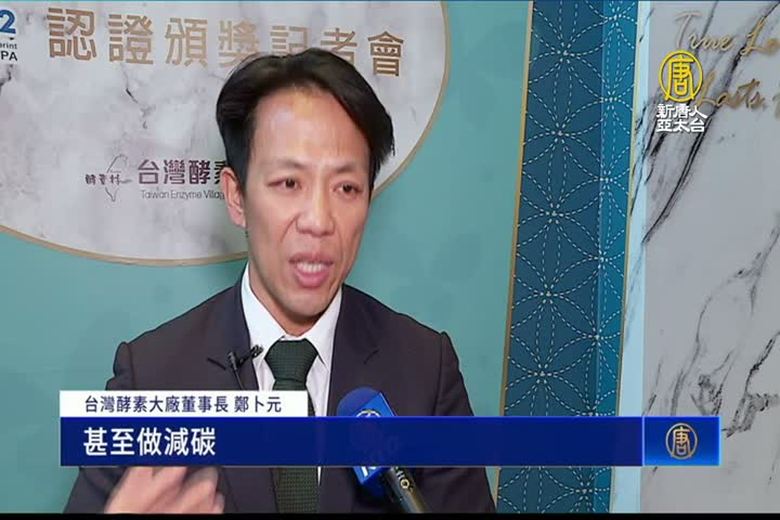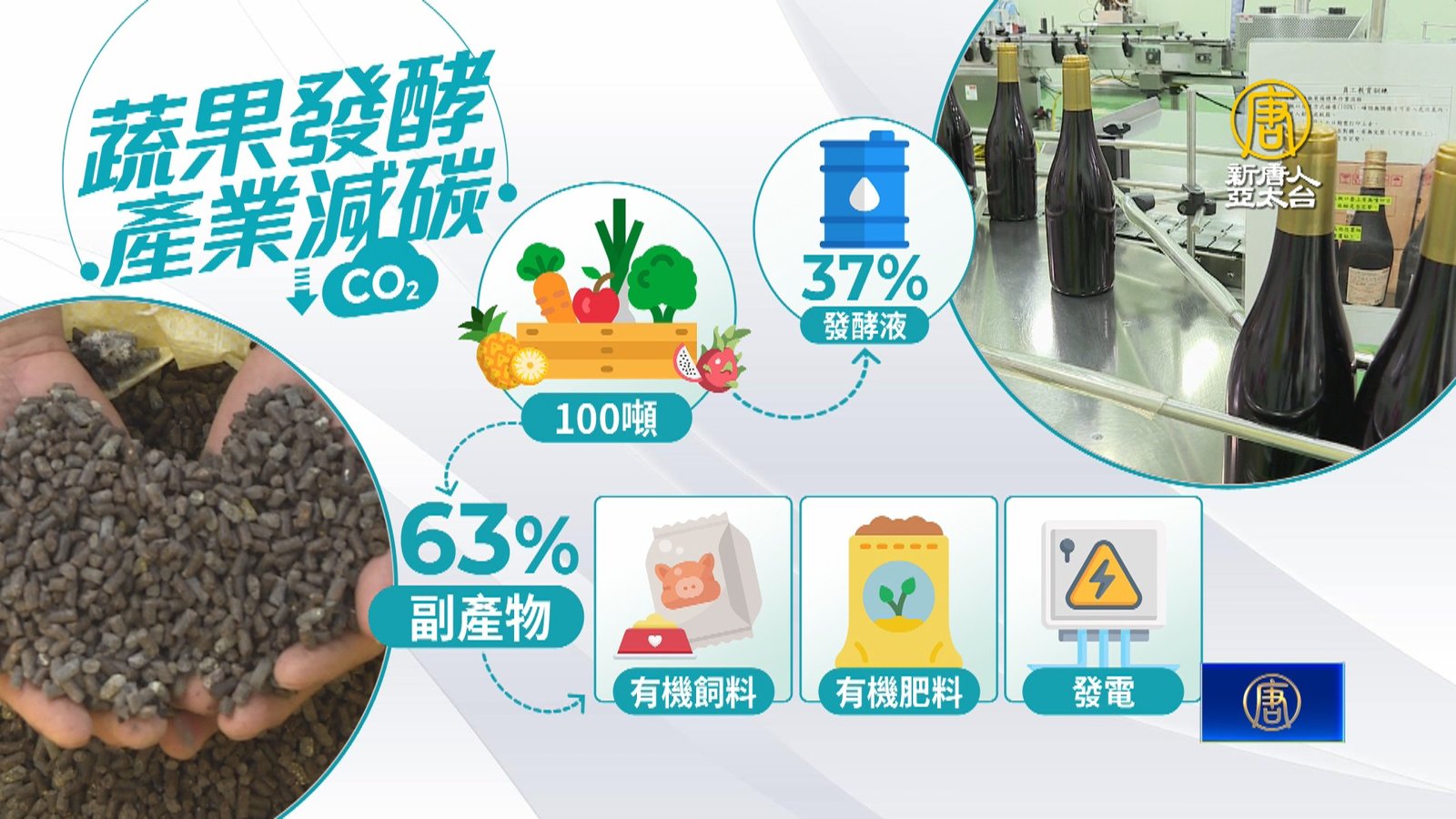Enzyme Residue Becoming Gold! Tony Cheng Built an Ecochain in the Enzyme Field in Taiwan
【新唐人亞太台 2020 年 10 月 27 日訊】台灣一年農業廢棄物高達462萬公噸,如果當垃圾丟棄,將對環境造成很大的負擔。帶您看到一家在台灣40多年的老字號酵素大廠,第二代接班人鄭卜元,把廢棄物變黃金,將酵素渣 循環再利用,不僅友善環境,種出來的茶 也別具風味。並且與產官學研合作,打造台灣酵素產業生態鏈,還進一步 推向國際市場。
Taiwan produces over 4.62 million tons of agricultural waste per year. If we throw it away like garbage, it will become a burden for the environment. Let us show you a large enzyme factory that has been open for business for over 40 years in Taiwan. Tony Cheng, the second-generation boss, turns waste into gold. He recycles and reuses the enzyme residue and uses it as fertilizer. It is eco-friendly and the tea leaves he grows have a special flavor. Besides this, he performs academic–industrial cooperation to build an ecochain in the enzyme field in Taiwan. What’s more, he promotes the product in the international market.
茶農細心施肥,用酵素發酵後的果渣作為肥料,使茶樹充分吸收酵素肥中的養分。把「酵素渣變黃金」,循環再利用,是台灣酵素大廠第二代接班人,鄭卜元,友善環境的做法。
Tea farmers fertilize the fields carefully. Fruit and vegetable peels are fermented with enzymes and used as the fertilizer. Tea trees absorb the nutrition in the enzyme fertilizer completely. “The enzyme waste is thus turned into gold.” The recycling and reuse of the enzymes is an eco-friendly method utilized by Tony Cheng, the second-generation boss of a large enzyme factory in Taiwan.
台灣酵素大廠董事長 鄭卜元:「一噸的桶槽去做發酵,它基本上,就至少會有一半左右的那個渣,所以我們一年做下來,幾千桶下來,所以它基本上幾千噸那個渣。去變成酵素肥料,讓它做進一步的利用。」
Tony Cheng, the Chairman of a large enzyme factory in Taiwan says, “If we ferment a barrel, enzyme waste of at least half barrel will be generated. As a result, thousands of barrels will be generated in our factory per year. And that volume equals to thousands of tons of the fruit and vegetable peels. So, we turn the fruit and vegetable peels into enzyme fertilizer to make use of it.”
茶農 簡玉周:「茶葉比較厚,葉綠素比較飽和。」
Chien Yu-Chou (tea farmer) says, “If the tea leaf is thicker, it contains more chlorophyll.”
台灣一年農業廢棄物高達462萬公噸,如果當垃圾丟棄,對環境負擔極大。67年次的鄭卜元,不僅把酵素應用延伸,更推行地方經營,與國際學術交流。為40多年老字號品牌,注入多元的創新思維。
Taiwan produces over 4.62 million tons of agricultural waste per year. If we throw it away like garbage, it will become a burden for the environment. Born in 1978, Tony Cheng extends the application of enzymes, promotes local business and interacts with the international academic field. He brings diverse and innovative thinking for the brand that owns a history of over 40 years.
台灣酵素大廠董事長 鄭卜元:「嘉義大學這邊有,很長期的一個合作,那也從整個發酵過程當中,去篩檢到獨特的菌種。海外去做發表,那也確實得了一個,得了一個獎項。」
Tony Cheng, the Chairman of a large enzyme factory in Taiwan says, “We have been cooperating with National Chiayi University for a long time. The team in the University found a special strain in the fermentation process. It published the findings overseas and won a prize.”
鄭卜元也是第一個,成功將酵素進軍非洲國家的,台灣人。
Tony Cheng is the first Taiwanese who successfully introduced enzymes to African countries.
台灣酵素大廠董事長 鄭卜元:「我是認為是說,你有人就有市場。東南西北中非,也是10多億人,那為什麼一定要在中國,或者是說印度,人口來講他也是10多億人,不輸給中國,那這些市場為什麼,不去嘗試著做。」
Tony Cheng, the Chairman of a large enzyme factory in Taiwan says, “Personally I think if there are people, there is a market. There are more than 1 billion people living on the African Continent. So, there’s no reason we can only operate in China. India has a population of over 1 billion people, and that number is not that much behind China. So, I don’t see any reason why we should not try to introduce the product to the Indian market.”
對經營管理,鄭卜元有自己一套獨到觀點。其實,鄭卜元想做的是,打造台灣酵素產業的生態鏈。
Tony Cheng has a distinctive perspective for business management. In fact, Tony Cheng wants to build an ecochain for the enzyme industry in Taiwan.
台灣酵素大廠董事長 鄭卜元:「我們這個產業沒有污染,是綠色產業,我們跟農民收購,收購的整個發酵過程當中沒有廢水,沒有廢煙,發酵完之後的渣,還可以變成肥料回到農田裡面去。那所以,酵素村它會是,一個是完全無污染的綠色產業。」
Tony Cheng, the Chairman of a large enzyme factory in Taiwan says, “Our industry does not produce pollution. It is a green industry. We purchase agricultural waste from farmers and no wastewater or smoke is generated during the fermentation process. Besides this, the enzyme waste generated after the fermentation can be used as a fertilizer in the fields. As a result, the Taiwan Enzyme Village is a pollution-free and green business.”
酵素在生產過程中,會植入不同菌種,經過第二階段發酵後,再做混合,至少有100種不同的原物料。整個發酵過程,需要1年的時間。
During the production process of the enzyme, different strains will be placed in the culture space. After fermentation of 2 stages, the ingredients will be mixed together. There are over 100 ingredients used in the process. The whole fermentation process takes about a year.
台灣酵素大廠董事長 鄭卜元:「在台灣這個地方,是可以很方便的,去取到,每個季節不同的農作物,來做發酵,那這些農作物就是酵素,製作很重要的原料。」
Tony Cheng, the Chairman of a large enzyme factory in Taiwan says, “In Taiwan, we can conveniently acquire different kinds of crops in every season for the fermentation. These crops are important ingredients for producing enzyme.”
台灣農作物產豐饒,是領先全球的優勢。鄭卜元更秉持家訓「真誠」的精神,對生產嚴格把關。
Taiwan produces diverse kinds of crops and this is our advantage to lead the globe. Tony Cheng upholds the family philosophy of “integrity” and is strict with the production process.
台灣酵素大廠董事長 鄭卜元:「我們家訓是真誠,所以必須把產品做好。不是亂做的,不是亂來的,比方說市場上都會有一些,比方說黑心產品,那至少你在產品的把關上,必須是真材實料,真的按規範去做的。那我們這個產業也不能是對環境,有傷害的。」
Tony Cheng, the Chairman of a large enzyme factory in Taiwan says, “My family philosophy is integrity. As a result, we produce good products only. We do not produce bad products with no quality. For example, there are some harmful products on the market. But for us, we are strict with our products and we use ingredients of good quality to produce products in accordance with the regulations. Besides, our industry should not be harmful to the environment.”
40年前,鄭卜元的父親、第一代創辦人鄭金鎮,到日本學習酵素工藝後,在台灣延續扎根。40年後,第二代接班人鄭卜元,傳承父親酵素工藝,布局全球,拓展國際市場。
40 years ago, Tony Cheng’s father, Cheng Chin-Chen, who was the first-generation founder, went to Japan to learn the skills for producing enzymes. After he came back, he rooted in Taiwan. 40 years later, Tony Cheng, the second-generation boss, obtained the skills from his father. He has expanded the business to a global level and introduced the product to the international market.
採訪撰稿:李晶晶
攝影後製:葉錫鴻 曾奕豪
Interview and writing: Li Jing-Jing
Recording and post-processing: Yeh Hsi-Hung, Tseng Yi-Hao
Information
-----------------------------
Taiwan Enzyme Village Co., Ltd.
886-5-2065500
No. 6-2, Neighborhood 3, Shuangyuan, Pinghe Village, Minxiong Township, Chiayi County
相關新聞
-

酵素渣變黃金!鄭卜元打造台灣酵素產業生態鏈
2020-08-29 18:18:46台灣一年農業廢棄物高達462萬公噸,如果當垃圾丟棄,將對環境造成很大的負擔。帶您看到一家在台灣40多年的老字號酵素大廠,第二代接班人鄭卜元,把廢棄物變黃金,將酵素渣 循環再利用,不僅友善環境,種出來的茶 也別具風味。並且與產官學研合作,打造台灣酵素產業生態鏈,還進一步 推向國際市場。
-

老字號食品廠減碳轉型 拿下嘉縣第一碳足跡標章
2023-04-15 21:14:17全球暖化與氣候變遷,讓淨零碳排成為企業界關心的議題;嘉義縣環保局週五(14日)舉行產品碳足跡認證通過記者會,縣長翁章梁親自頒獎表揚5間在地企業,同時邀請獲獎廠商分享通過碳足跡認證的過程。
-

全縣第一家!嘉義老字號食品廠獲碳足跡標章
2023-02-08 11:44:16台灣跟上國際淨零碳排腳步。農工大縣嘉義縣一家食品大廠,拿下全縣第一個碳足跡標章,董事長鄭卜元首度分享減碳理念。
-

首座5G XR O-RAN實驗場啟用 專網供5G創生運用
2021-10-15 22:11:21為提供業者免費運用5G專網研發平台,高雄市政府與經濟部工業局、科技產業園區(加工處)以及HTC合作,在高雄軟體園區鴻海大樓2樓打造的首座「5G XR O-RAN實驗場」,希望邀請有志發展業者一起加入5G國家隊。
















